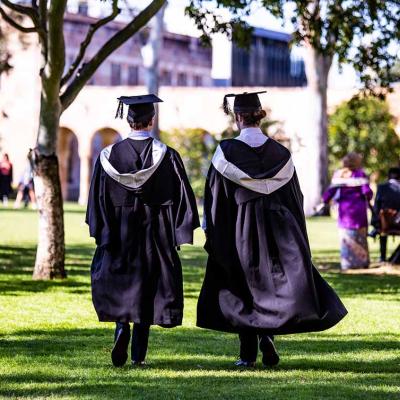Careers in the arts and communication industries are evolving rapidly, driven by technological advancements and new innovations.
Whether you’re interested in writing for non-traditional genres, the strategy behind public arts projects, or the innovative world of digital publishing, there’s a career here that will allow you to thrive in a field you're passionate about.
High-paying careers in the arts and communication sectors require digital literacy, creativity, and the ability to forge human connections. In an era of artificial intelligence, human creativity and critical thinking have never been more valuable.
New career trends have seen communication specialists taking on the world of Esports, writers working alongside UX designers, and literary agents becoming pioneers in digital publishing technologies.
If you're looking for inspiration, here’s a glimpse into some of the emerging and high-paying careers in the arts and communication industries.

Esports and gaming communication specialist
The billion-dollar gaming industry has seen enormous growth and is now worth more than the music and film sectors combined. Digital agencies that specialise in gaming are now helping brands tap into this expanding market.
Key skills include:
- community engagement and relationship building
- ability to develop social strategies
- strong and clear communication
- critical thinking capabilities.
Meet Vindhya, a project manager at You Know Gaming
Vindhya Barwal graduated from the Master of Communication in 2020 and now helps brands level up in the world of online gaming. She's the talent and project manager at You Know Gaming, a digital agency that specialises in Esports and gaming. She also remains connected to UQ and is currently a tutor for the Gaming Cultures (COMU2100) course under Dr Maureen Engel's guidance.
The Master of Communication prepared Vindhya for her current role by providing knowledge of communication strategies and the practical tools needed to succeed in the industry.
“Through my Master of Communication, I understand people better now – whether it’s my target audience, a competitor, or my own organisation.”

Public art program manager
A public art project manager is responsible for the planning, development and implementation of the components required to bring a public art project to life. Sculptures, murals, interactive digital spaces, performances and arts events – all align to bring people together.
Key skills include:
- project planning
- community engagement
- in-depth knowledge of the arts sector
- an aptitude for collaboration.
Meet Andrea Bubenik, Associate Professor of Art History
Andrea Bubenik is an Associate Professor of Art History in UQ’s School of Communication and Arts. She's passionate about helping students obtain industry experience throughout their studies, to better equip them for a career in the arts.
UX / technical writer
Technical writers play a key role in UX design. Working alongside UX designers, they assist by crafting concise, user-friendly copy for digital interfaces – such as buttons, menus and error messages. Being able to write in a clear, engaging and accessible way is essential. With a deep understanding of user needs, technical writers help create meaningful content that supports functionality and understanding.
Key skills include:
- clear and concise writing
- user-centred focus
- strong communication skills
- excellent attention to detail.
Professional Writing and Communication graduates have the expertise to succeed in communication roles across a range of industries, including technical writing, communications and copywriting. This major can be studied through the Bachelor of Arts or the Diploma in Arts.

Social producer and content creator
Social media producers and content creators are responsible for planning, creating and managing content across social media platforms. Many brands have now shifted to a social-first strategy when it comes to reaching their audiences, meaning these skills are in high demand.
Key skills include:
- content creation and storytelling
- data interpretation
- platform knowledge and strategy
- community engagement and relationship building.
Meet Sophie Milner, social producer and content creator for Hello
Sophie Milner graduated from UQ’s Bachelor of Communication / Bachelor of Arts in 2022. She now works as a social producer and content creator at Hello, one of Australia’s most awarded social media and influencer agencies. Her main client sits within the television industry, so she is often on set producing social-first content for a range of TV shows. Her day-to-day involves creating bespoke social media strategies and editing social content.
“Through my Bachelor of Communication, I gained expertise in creative writing, multimedia, online content production, social media engagement, and campaign development,” says Sophie.
Sophie explains how the variety of internships offered throughout her Bachelor of Communication gave her the industry experience she needed to launch her career upon graduating.
“Paired with a range of internships in the marketing and social media space, my time at UQ gave me invaluable experience that has truly launched my career in the communications industry.”

Literary agent
A literary agent is someone who represents writers, negotiates publishing deals, and identifies literary trends. BookTok, a subcommunity of video-sharing app TikTok, has become a powerhouse in the literary world, disrupting industry norms and creating new trends and opportunities for authors and agents. Success in the field now involves a high degree of digital literacy: understanding e-books, self-publishing options and social media branding.
Key skills include:
- ability to develop engaging narratives
- digital literacy
- in-depth knowledge of the industry
- social media strategy.
Meet Dr Richard Newsome, Director – Master of Writing, Editing and Publishing
Dr Richard Newsome directs UQ’s Master of Writing, Editing and Publishing program. He explains that graduates of the program not only find work in publishing but also in many other industries.
Digital journalist
The media landscape has evolved, and journalists and media consultants now need to navigate the complexities of reporting in a digital age. While strong writing skills remain fundamental, digital journalists also require high levels of digital literacy to collect data, produce multi-media content, and to engage with diverse audiences across multiple platforms.
Key skills include:
- digital literacy
- multimedia skills
- strong storytelling and narrative building
- relationship building.
Meet Kyle Rode, journalism cadet for NewsCorp Australia
Having graduated from UQ with a Bachelor of Journalism in 2024, Kyle Rode is currently on a cadetship with NewsCorp Australia. He has a keen interest in advancing news narratives for broader accessibility and influence.
Kyle explains how his UQ studies assisted him in landing a highly competitive ABC cadetship upon graduation.
“The Bachelor of Journalism gave me the skills to obtain a year-long journalism cadetship, accelerating my learning across multiple newsrooms," he says.
“This was only achievable due to the incredible inspiration from lecturers, tutors and the many friends I made in my cohort – some of whom I actively work with.”
Final thoughts
High-paying careers in the arts and communication industries are varied and evolving. Whether you’re interested in working at the intersection of technology and creativity, or in bringing people together – these industries offer exciting opportunities for career growth in a field you're passionate about. Developing key skills in digital literacy, critical thinking and creativity will give you the tools you need to thrive in these industries and beyond.
Want to learn more about one of the arts and communication degrees mentioned in this article?
Undergraduate study options:
Postgraduate study options:










